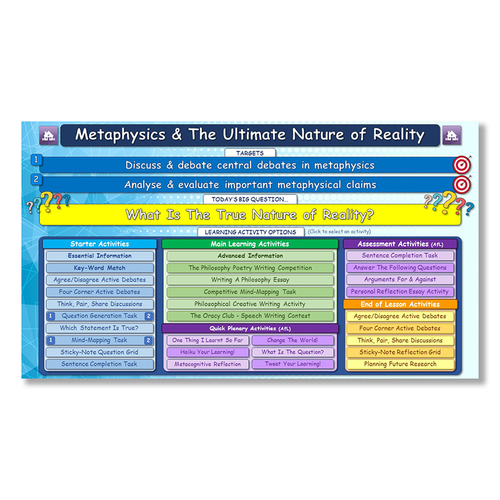













This multi-use interactive learning session explores metaphysics, the field of philosophy concerned with the nature of reality, perception, and existence. Metaphysics also explores issues relating to causality (such as the free-will vs determinism debate), the nature of the mind and its relationship to reality, and more specific issues such as time and the nature of mathematical truths.
This session is ideal for teachers who want to explore philosophy with students and might be of particular interest to teachers of science (especially physics); we’ve carefully selected the most significant metaphysical issues and questions so that young learners can engage in fun philosophical discussions and debates.
This session explores topics such as:
- The nature of reality
- The degree to which we can perceive reality directly
- The nature of the mind and its relationship to reality
It outlines and explores different metaphysical views (such as physicalism and idealism) as well as different theories of perception (such as direct realism and indirect realism).
The big question asked in this session is “What is the nature of reality?”. Using a variety of engaging activities students will discuss and debate a wide range of other philosophical questions such as
- To what extent can we perceive reality directly?
- To what extent is reality an entirely material or physical system?
- How can a purely physical world generate minds, consciousness and mental experiences?
Students will also analyse and evaluate an eclectic mix of philosophical claims such as:
- “It is impossible to know the true nature of reality”
- “Trees have experiences” and
- “The mind is not a material object”
This session uses our unique format for philosophy teaching resources and features an integrated menu that allows teachers to select from a variety of starter, main, plenary, assessment and end-of-lesson reflection activities. With a massive selection of activities designed to trigger philosophical discussions, debates and reflections: you can re-use the resource numerous times with the same group.
Aside from a wide range of debate and discussion activities, teachers can also choose from a variety of more substantial activities such as essay writing, poetry writing, and speech writing tasks.
This resource is suitable for teachers of all school subjects who are looking to introduce philosophy, philosophical thinking and critical thinking. As with all our resources, this session will help students to develop vital communication, social and interpersonal skills: healthy debates will help learners to practice ‘disagreeing in an agreeable fashion’.
Something went wrong, please try again later.
A lovely PPt however I cannot amend any aspect as it only opens as a slide show, so unfortunately a total waste of money.
Report this resourceto let us know if it violates our terms and conditions.
Our customer service team will review your report and will be in touch.